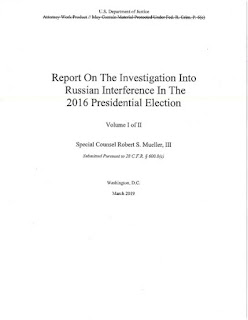Impeachment and the Mueller Report
April 22, 2019; April 23
Politics and the ConstitutionRelated:
* Presidential Candidates Rankings, April 15, 2019 (with updates)
* Impeachment and the Mueller Report, April 22, 2019 (with update),
* Presidential Experience: How Your Candidate Measures Up, April 28, 2019
* Democrats Qualified for Debates: Will Your Candidate be in the Debates? April 29, 2019
* Dem Primary Candidates' Ranking - May 2, 2019: How's Your Candidate Ranked?, May 2, 2019
* May 4 Updates: Popularity; Klobuchar; Iowa 2nd District, May 4, 2019
* What Dems are up against; some insights from 2-1/2 years ago: Donald Trump’s Barrel of Squirrels: How Does the Donald Do It? Sept. 26 2016
* Attacks on our democracy and what we can do about it: Columns of Democracy available from Iowa City’s Prairie Lights and Amazon.
The Constitution specifically imposes on every member of the House of Representatives the power and responsibility for impeaching a president. ("The President ... shall be removed from Office on Impeachment for, and Conviction of, Treason, Bribery, or other high Crimes and Misdemeanors." Art. II, Sec. 4. "The House of Representatives ... shall have the sole Power of Impeachment." Art. I, Sec. 2.5. "The Senate shall have the sole Power to try all Impeachments." Art. I, Sec. 3.6).
There is no provision excluding this responsibility from "cases in which so doing might result in a House member's inability to be reelected," or "cases in which conviction by the Senate is highly unlikely." It is as inappropriate (and possibly unconstitutional) for a member of the House to fail to support an impeachment inquiry for partisan reasons as for that Member to pursue impeachment for partisan reasons.
The founders laid this responsibility upon the House for reasons similar to their choosing the House as the body to declare war (a constitutional obligation House members have also sidestepped) -- because it is the closest to the people who will bear the burden of both decisions.
Grounds for Impeachment
Not only is it impossible to read the Mueller Report -- or even the books and daily newspaper reports about President Trump -- without concluding that an impeachment inquiry is clearly warranted, but the Report's authors suggest that is their conclusion as well.
Although constrained by the distinctions between the powers of an "Independent Counsel" and a "Special Counsel," and their lack of authority to indict a sitting president, the authors note that "a criminal investigation during the President's term is permissible" (vol. II, p. 1), and that "a President does not have immunity after he leaves office," leading to their decision to conduct "a thorough factual investigation in order to preserve the evidence when memories were fresh and documentary materials were available." (vol. II, p. 1). That certainly sounds like a contemplation of at least the possibility of an indictment for obstruction of justice after Trump leaves office. This conclusion is reinforced with the comment that "we are unable to reach [the] judgment . . . after a thorough investigation of the facts that the President clearly did not commit obstruction of justice ... " (vol. II, p. 2) along with the ten or more categories of "overarching factual issues" and "general statements about the President's conduct." (vol. II, p. 7).
In addition to possible future indictments for obstruction of justice, the Report states, "The conclusion that Congress may apply obstruction laws to the President’s corrupt exercise of the powers of office accords with our constitutional system of checks and balances and the principle that no person is above the law.” (vol. II, p. 8)
Finally, a simple comparison of the charges and findings regarding the behavior of Trump against those of the two presidents impeached by the House during the past 50 years renders laughable any suggestion that Trump's offenses do not warrant an impeachment inquiry.
President Richard Nixon's impeachment involved his response to an old fashioned physical break-in at Democratic Party headquarters. The articles of impeachment were for obstruction of justice, abuse of power, and contempt of Congress. (The latter was for Nixon's refusal to comply with Congressional subpoenas -- something Trump is currently doing, although Trump is going above and beyond mere refusal by actually suing the Congressional committee!). (https://en.wikipedia.org/wiki/Impeachment_process_against_Richard_Nixon).
For Trump Administration's current refusal to comply with Congress' demands, see Peter Baker, Annie Karni and Alan Rappeport, "Democrats Ask and Trump Says No, Signaling a Bitter Fight Ahead," New York Times, April 23, 2019, p. A12, and Robert Costa, Tom Hamburger, Josh Dawsey and Rosalind S. Helderman, "Trump Says He is Opposed to White House Aides Testifying to Congress, Deepening Power Struggle with Hill," The Washington Post, posted April 23, 2019, 8:28 PM.
President Bill Clinton's two article of impeachment -- for perjury and obstruction of justice -- grew out of a "sexual harassment lawsuit filed against Clinton by Paula Jones" and inappropriate sexual encounters with a White House intern. (https://en.wikipedia.org/wiki/Impeachment_of_Bill_Clinton).
Impeachment Alternatives
If, as Speaker Nancy Pelosi and many other Party leaders urge, there is not to be an impeachment of President Trump, notwithstanding the constitutional obligations of House members, I have urged alternatives such as House resolutions or censure.
What the House must provide, for the sake of our democracy and constitution, as well as the legacy of this House, is more than mere multiple congressional committee hearings. There must be some form of House action, with a recorded vote of each member.
Following the publication of this blog post analogous analyses have been published. Here are two (with no suggestion this blog post was read by either of them, something I would consider highly unlikely):
Hillary Clinton, "Mueller Documented a Serious Crime Against All Americans. Here's How to Respond," The Washington Post, April 24, 2019, 4:44 PM
Elizabeth Drew, "The Danger in Not Impeaching Trump; It may be risky politically, but Congress has a responsibility to act," The New York Times, April 25, 2019

No comments:
Post a Comment